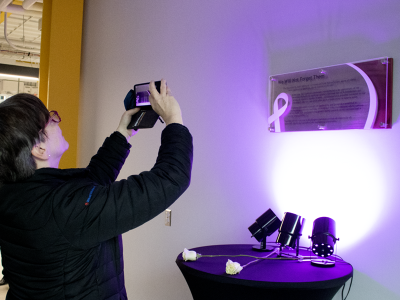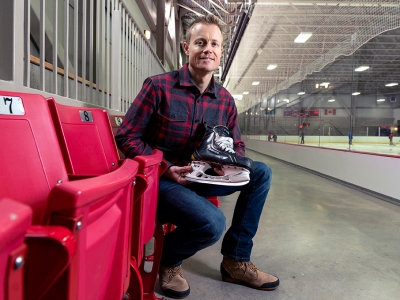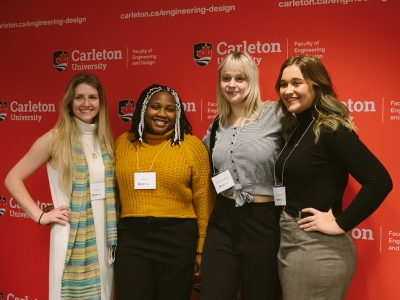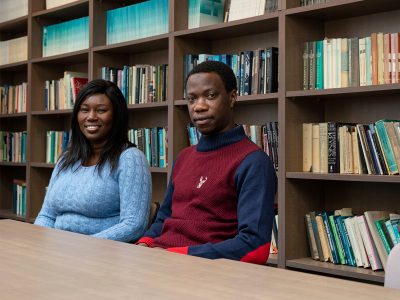By Alexandra Sebben
Creating a diverse and inclusive workforce starts long before students graduate. One of the early steps is welcoming students into a classroom environment where they: feel welcomed, safe to collaborate, and supported to develop their identity.
Understanding the role educators, industry, and students all play in culture building, the Faculty of Engineering and Design’s outreach team recently organized its second annual panel for prospective students and their parents/guardians to learn about Carleton’s commitment towards advancing a transformational culture where everyone thrives.
Hosted on March 1 and moderated by Alvin Lin (second year Interactive Multimedia and Design student), the panel event featured Prof. Christian Viau (Department of Civil and Environmental Engineering), Dr. Lindsay Beaton (BEng Engineering Physics, MSc and PhD in Medical Physics), and Ayesha Dassanayake (second year Aerospace Engineering student). Together, they spoke about the identities they’ve established in being part of Carleton’s Faculty of Engineering and Design and the skills they have developed being part of the engineering and IT community.
Support Inside the Classroom
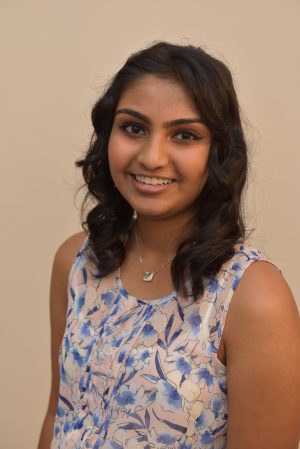
Ayesha Dassanayake – 2nd year student, Aerospace Engineering (Stream B: Aerospace Structures, Systems, and Vehicle Design) and Engineering Scholar at the Elsie MacGill Learning Centre
Ayesha Dassanayake was first drawn to STEM in high school by taking STEM-related subjects. She remembers being excited by the field of engineering, but wondered if there was a path for her since the profession was a male dominated space. Would she feel included?
“After attending panels, like this one, I got to see more representation of women in STEM and visible minorities,” says Dassanayake.
“After seeing the Carleton community I saw that there was a significant growth in the representation I had seen before. I felt more comfortable seeing myself represented in the community.”
Now, Dassanayake is pursuing a degree in aerospace engineering, one of the most competitive aerospace engineering programs in the country. Inside the classroom, she is learning that diverse backgrounds and perspectives will each take their own view on understanding assignments and looking at how to solve them from differently angles.
“It’s beneficial for everyone to learn a new approach to problem solving,” Dassanayake says.
Professor Christian Viau, who recently joined Carleton, builds on this idea by reflecting back on his time as an undergraduate and graduate student.

Dr. Christian Viau – Assistant Professor, Department of Civil and Environmental Engineering
“As a French Canadian and the first person in my family to go to university and receive a post-graduate degree, I had challenges to overcome,” Viau says. “Could I do this myself? Am I meant to do this?”
As a member of the queer community, Prof. Viau values diversity among his colleagues, students, and the border Carleton community. Being at a university means introducing yourself to different views, which helps one enrich their own view on society. He goes on to say that his experience in STEM has shaped his identity.
“Civil engineering is often associated with getting dirty, working in laboratories, working with concrete, and getting your hands dirty,” says Prof. Viau.
“As a queer person, it helped me come out and say I can also do this. In essence, anyone can do this [line of work] and [diverse representation] helps breaks down pre-existing notions or stereotypes.”
Support Outside the Classroom
One of the first support systems students have access to at university is their friends. The people they develop close relationships with who are there to support them at every step along their academic journey and beyond. Dassanayake reflects on the role her professors have played in this regard.
“The professors I’ve had really promote inclusion within the workspace by encouraging students to work with new groups and encouraging honest, respectful conversations.”
Professor Viau agrees.
“Educators are becoming more educated about equity, diversity, and inclusion and how to apply these learnings in a professional setting,” he says.
Professor Viau adds that students will have access to many support systems outside the classroom offered by their university. Students should always browse their university’s listings of support services which range from—academics, finances, and employability to campus life, wellness, and finding success in an online environment—like the ones listed on Carleton’s main account.
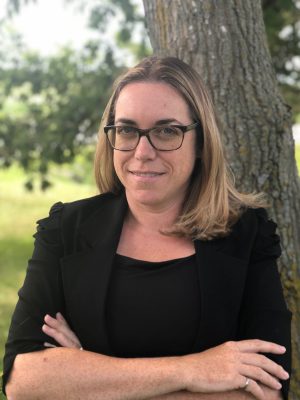
Dr. Lindsay Beaton (BEng in Engineering Physics, MSc and PhD in Medical Physics) – Research Scientist & Risk Assessor at Health Canada’s Consumer and Clinical Radiation Protection Bureau
Alumna Dr. Lindsay Beaton reflects on her time at Carleton, as an undergraduate and graduate student, and the role student leadership positions played in helping her thrive outside the classroom.
“I remember being quite shy and pushing myself to participate in volunteer opportunities, within the engineering community,” she notes.
Beaton says she was able to use her volunteer positions to her advantage upon graduation and finds her passion for volunteerism continues with her in her professional role.
“I’m quite active in a number of initiatives within the government, including EDI commitments at Health Canada. I’m also an active mentor with Carleton’s mentorship program.”
Beaton goes on to say, “try new things and explore your options [when it comes to finding support outside the classroom]. I’ve found it led me to make interesting connections and meet new people.”
Support Within the Industry
It can be a mixture of excitement and nerves, being a student your entire life and then embarking on your first professional role like a co-op position or internship. Moderator Alvis Lin asked the panel to conclude with their final thoughts: how do students make the leap from school to the workforce?
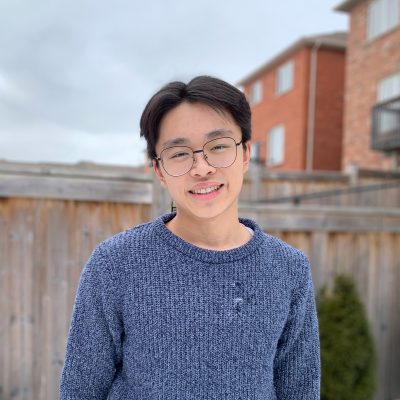
Alvis Lin – 2nd year student, Interactive Multimedia and Design and member of the Faculty of Engineering and Design’s student outreach team
“I come from a family of farmers who didn’t have experience with the government system so I’ve had to navigate that on my own. I’ve found so many resources, tools, teams, and opportunities in the federal government [unique to Ottawa].”
Beaton adds, “seek out mentors. They can help you develop your confidence, guide you, and make connections.”
Professor Viau’s advice to students is to network. Networking might not what you think it is in the traditional sense—like going to a conference—today, it can be befriending new people on student projects or reaching out to someone from another class you want to meet.
Dassanayake says to take advantage of the First Year Connections Program. First year students will be paired with an upper year student in their program to help you transition from high-school to university. As someone who was on the mentor and mentee side of the program, she said she was able to get an early taste of what the engineering industry would be like, which was complimentary to her studies.
Alvis wrapped up the conversation by highlighting his experience as a co-op student. “I remember feeling stressed about applying for a co-op position. Writing a resume and cover letter and best practices for interviewing was a new concept for me.” He added, “Carleton’s co-op program offers beneficial resources like first-hand testimonials from students who have completed co-op. It helped ease my stress.”
If you weren’t able to attend the panel event live, watch the full recording below. Our FED outreach team facilitates many events throughout the year, which can be found here on our website.
Monday, March 21, 2022 in Events, Feature Stories, Undergraduate, Women in Engineering
Share: Twitter, Facebook
